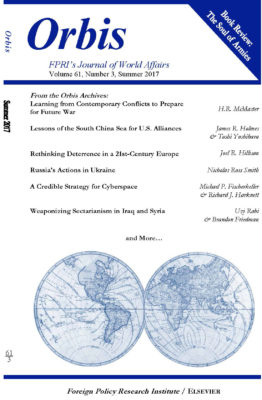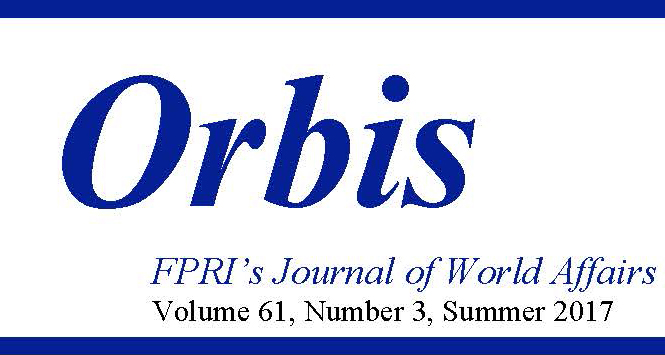A nation must think before it acts.
Announcing the Summer 2017 Issue of Orbis: FPRI’s Journal of World Affairs

Welcome to the summer issue of Orbis. As always, the journal offers articles that address a wide variety of topics of interest to those concerned with global security. We open the issue with a piece of historical importance: an article from the Fall 2008 issue of Orbis by H.R. McMaster, now President Donald Trump’s national security advisor. In this article, McMaster addressed the danger of basing our approach to conflict on simplistic and optimistic conceptions of war that ignore its enduring uncertainty and complexity.
Frequent Orbis contributors, James R. Holmes and Toshi Yoshihara, address potential strategies to undermine what they call China’s “gray-zone” strategy by raising political and operational barriers to entry for the Chinese, thereby causing Beijing to think twice before making its next move.
This issue features two article clusters. The first addresses Russia. Joel R. Hillison examines U.S. foreign policy toward Russia, which has been strained as a result of the latter’s aggression in Ukraine and its intervention in the Syrian civil war. He contends that the United States is trapped in a classic security dilemma with Russia. Only by analyzing the fundamental motivations of why states go to war can the United States successfully deter Russia without exacerbating the current security dilemma.
Nicholas Ross Smith takes issue with the West’s portrayal of Russia’s policy toward Ukraine. He contends that rather than being imperialistic and irrational, Russia’s perceptions of Ukraine are based on the belief that Ukraine represents a vital Russian national interest.
Carol Lutz employs the situation in Ukraine to test Transnational Ethnic Alliance Theory, which posits that the majority ethnic group in one state will come to the defense of its ethnic brethren who are a minority in a neighboring state, if that group is facing discrimination or repression. She argues that in light of Russia’s actions in Ukraine, this theory must be modified to reflect the fact that intervention allegedly on behalf of an ethnic minority will only occur when it is in the self-interest of the neighboring state or in the self-interest of the governing elite of that state.
Our second article cluster looks at U.S. cyber strategy. Michael P. Fischerkeller and Richard J. Harknett argue that the U.S. strategic approach to cyberspace is failing against cyber threats. It is also failing to take advantage of the security opportunities that flow from the uniqueness of cyberspace. That uniqueness, they contend, demands a unique strategy, a capabilities-based strategy of cyber persistence that is less adversary-centric and more focused on what the United States wants to be able to do in, through, and from cyberspace.
Robert Bebber contends that to meet the challenge of adversaries who seek to alter fundamentally the systemic balance of power through information-based strategies, the United States must understand that information is a strategic resource. To address this challenge, the United States must overcome debilitating intellectual constraints and adopt new operational models in order to erode its competitors’ economic and informational advantages, attack their dependencies on other strategic resources, and exploit their information control systems.
Joseph M. Siracusa and Hang Nguyen analyze the factors that have led to the remarkable evolution of U.S.-Vietnam relations over the 42 years since Vietnam’s reunification in 1975. Next, Uzi Rabi and Brandon Friedman consider how the scale and savagery of the ongoing conflict in Iraq and Syria have transformed Sunni-Shia sectarianism into a zero-sum politics of survival.
For this issue’s review essay, Olof Kronvall looks at Austin Long’s The Soul of Armies: Counterinsurgency Doctrine and Military Culture and the US and UK, which addresses the need for policymakers to understand accurately the cultures that permeate the military organizations in order to gain a firmer grasp of what those organizations can and cannot do.




